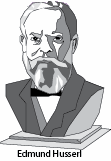
Predication and judgment—where objects are explicitly perceived as having certain properties and as falling into certain relations with one another—characterise the activity of the natural and human sciences.
But such theoretical thinking is grounded in a more basic life world of structures of bodily skill, tacit knowledge, and general understanding.
For example, the structure of space-time described by physics is grounded in a more basic "surrounding world" of in-front-of-me, behind-me, to-the-left-of-me, etc.
All the social sciences with their predicative judgments are grounded on phenomenonology—which studies consciousness and its forms.
Edmund Husserl (1954).